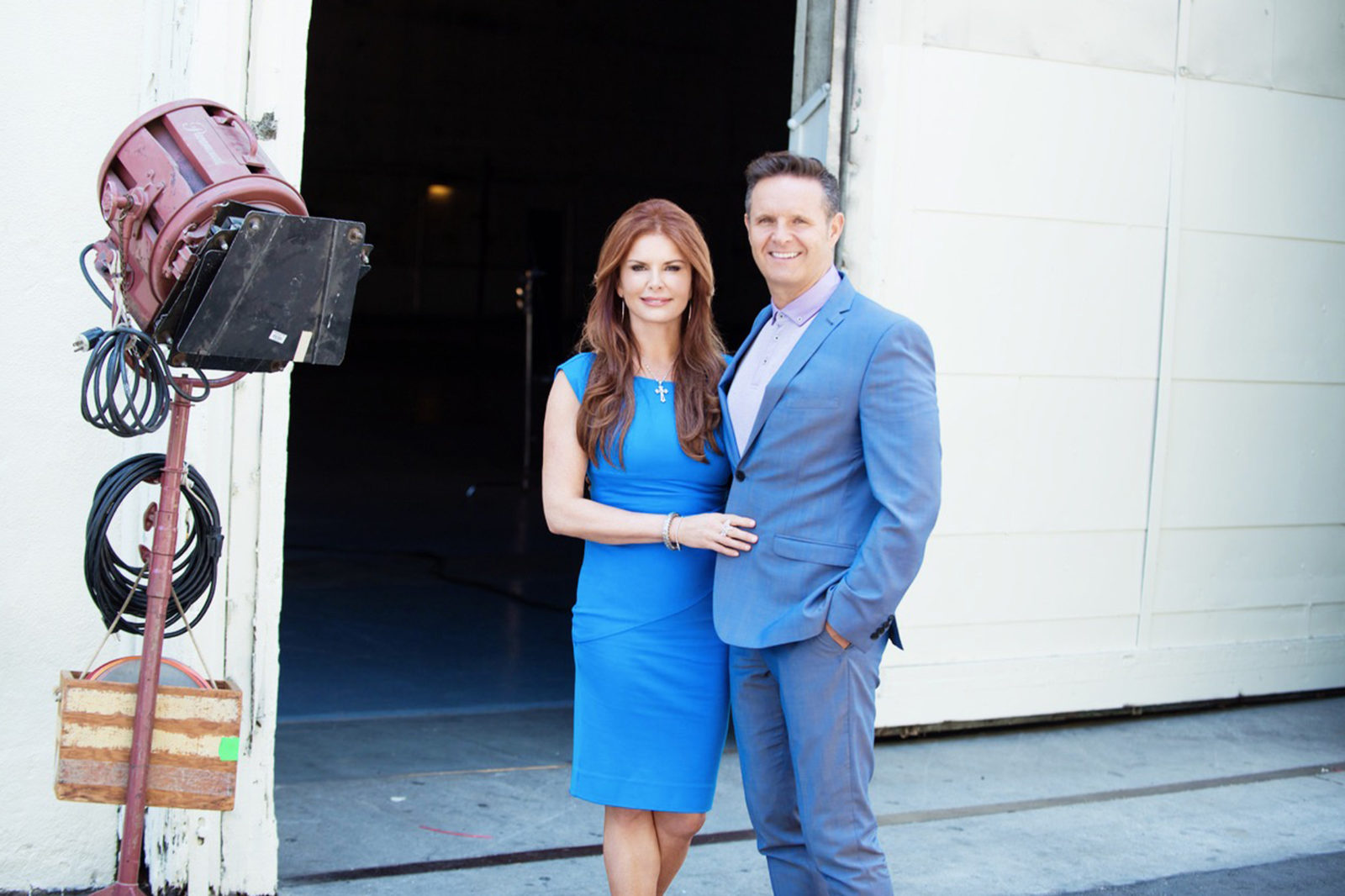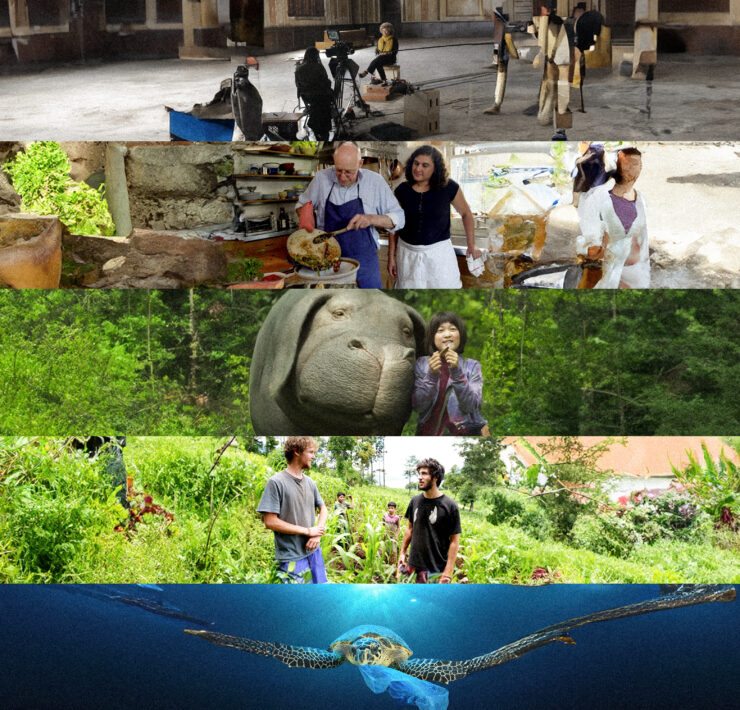For Easter weekend, Mark Burnett and Roma Downey, the power couple behind the record-setting History Channel miniseries The Bible, A.D. on NBC, as well as several faith-focused movies, are releasing a new project, Resurrection, this weekend on streaming platform Discovery+.
The film follows the other cinematic Gospel projects they’ve produced and was intended for a theatrical release. Then, like most other projects, the pandemic required them to change course a bit. We sat down with Mark and Roma to talk about Resurrection — and the challenges of telling this part of the Jesus story.
Tell us about Resurrection.
MARK: The movie really starts off where most things end around the crucifixion. The very beginning is the crucifixion and it goes onto the aftermath of the crucifixion, sticking very closely to the biblical text and adding in the emotional connection and the terror of the disciples.
It really plays out as a thriller. What’s going on during those three days, and then the 40 days afterwards. Some of the great moments are the opening of the tomb by the angel, how terrified those temple gods were, how Caiaphas bribed the guards to lie and say that the disciples stole the body, in fact it didn’t resurrect. And then Pentecost with the great flames coming down and speaking tongues. It’s something that’s not been seen in movies that often.
We had intended it to be in the theaters this Easter. We really were a bit ahead of ourselves thinking the pandemic was subsided, more vaccines, everyone’s back in the theaters. Around Christmas we said, “I’m not sure it’s going to be so accessible. Let’s get this on the streamer. It will be cheaper for everybody and it’ll be more widely available.” So, we’re excited it’s on Discovery+.
What were some of the challenges involved in creating this part of the story of Jesus?
ROMA: Maybe because people like to see a lot of Jesus on the screen. This period of time before he resurrects where we’re waiting on Him, it’s like having a movie and your star doesn’t show up for a while. Because He is after all the star of the film, He’s the star of our lives. It’s the greatest story ever told, but there were many, many challenges along the way to make a movie like this. Period drama in general brings its own particular set of challenges to create that authentic world.
Because we really wanted to build a world that would invite the audience to step back in time as if you’d pulled the curtain back into the first century. And how this drama plays out in Jerusalem at a time when the Roman regime was so oppressive, so cruel. But the movie plays out in a very exciting way. And Mark and I are just so thrilled that this particular Easter because this has been such an incredibly challenging year for all of us. I certainly know that we are all hungry for stories of hope. The resurrection story is only the greatest story of hope that there is.
You have the Bible to work off of when you create this. What are some of the other places that you go to help inform the script, the story, what things look like, how people talked?
MARK: Well, one of the most important things beyond the text of the Bible is finding the right writer or writers who can accurately take the text and add the emotional connection. In the end, if you think about it, the Bible has a lot of facts, but it doesn’t really connect the emotionality oftentimes. It’s just very, very fit the facts. For a movie to work, you have to create an emotional connection to the audience. The real test here is would someone who’s never read the Bible, someone has never been churched and doesn’t really care about this, watch this movie and be so drawn in seeing themselves in the disciples, seeing the fear of those disciples, the terror that their leader, Jesus, just got murdered brutally?
How do you make the characters feel more lived-in and more real? Do you think that addresses some of those criticisms in this particular special?
ROMA: I think so, certainly. In some of those older movies, there was a different style of acting then. It was a much more classical style. I mean, indeed a few years ago now, Mark and I tried to watch The 10 Commandments with our kids, the kids at that time were teenagers. They were shuffling and moving and they just didn’t engage them. It didn’t hold their interest. That was one of the inspirations for us making The Bible series in the first place, that we wanted to make a show that was compelling and gritty and exciting, and that the kids would want to engage with.
It’s more invitational that you can relate to the characters at different times in this movie. And I’ve seen it so many times now you can imagine through the various cuts you start to see yourself in each of the disciples. I mean, haven’t we all had doubts? So when Thomas comes into that upper room and he says, “I’ll only believe if I see Jesus myself. And if I get to touch his hands myself.” We all have a little bit of Thomas in us as well.
What parts were particularly rewarding for you when you finally saw the finished product?
MARK: There are epic moments, which would involve special effects, and there are poignant moments. From the epic moments, I think seeing the angel come down from the heavens to open the tomb. The temple guards are terrified, and it’s amazing as he rolls back that stone. And we see a shot from Jesus’ point of view, looking out the tomb as the angel appears to him. It’s kind of epic.
For a poignant point of view, this moment where Peter has to face the mother of Jesus, Mary Magdalene, and John who were at the cross, knowing he wasn’t. And his utter shame and horror to face them. You can think of any time you may have had to admit like, “Yeah, I am ashamed of myself. I let myself down there.” What awful moment. Imagine letting down Jesus, after three years of following him. The poignancy of that is amazing.
ROMA: I love the scene of Pentecost because it’s so just empowering. The fire and the flames are a great reminder to all of us that the Holy Spirit is available to all of us. But there’s one very small moment. It’s just a line really that we added in there when Peter and John come up to the tomb. The tomb is now empty and Mary Magdalene has told them the tomb was empty. And they come up to the tomb and John races inside the empty tomb and comes back out. And Peter says to him something like, “What’s in there?” And he says, “Nothing, and everything. I found nothing and everything.” It always just so touches me. Nothing, because the body is gone, and everything, because Jesus has risen. As we approach this Easter season, it’s just a good reflection to hold in our hearts.
Resurrection is streaming now on Discovery+.
























